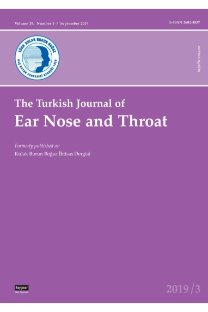Sıçanlarda radyasyona bağlı oral mukozitte propolisin etkisi
Amaç: Bu araştırmada, sıçanlarda baş-boyun bölgesine uygulanan radyoterapiye bağlı oluşan oral mukoza hasarı üzerine kantitatif, biyokimyasal ve histopatolojik yaklaşımlarla propolisin koruyucu rolü olup olmadığı belirlendi.Gereç ve Yöntem: Kırk sekiz adet, sekiz haftalık ve 213±27 gram ağırlığında Wistar Albino yetişkin dişi sıçan bu çalışmaya alındı ve rasgele altı gruba ayrıldı: Grup 1: kontrol, grup 2: sadece ışınlama uygulanan, grup 3: ışınlama ile birlikte 50 mg/kg/gün propolis verilen; grup 4: ışınlama ile birlikte 100 mg/kg/gün propolis verilen; grup 5: sadece 50 mg/kg/gün propolis verilen; grup 6: sadece 100 mg/kg/gün propolis verilen grup olarak belirlendi. İlk propolis dozu, ışınlamadan 30 dakika önce, diğer dozlar ise günde bir defa olmak üzere yedi gün boyunca topikal olarak uygulandı. Radyoterapi total kraniale, tek fraksiyonda, doz 18 Gy olacak şekilde verildi. Deney boyunca sıçanların mukoza muayeneleri ve ağırlık ölçümleri yapıldı. Yedinci günde sıçanlar ketamin anestezisi altında iken kan örnekleri alındıktan sonra sakrifiye edildi ve dil doku örnekleri alındı. Kan örneklerinde total kan sayımı, biyokimyasal ve antioksidan aktiviteler analiz edildi. Dil dokularında ise mikroskopik inceleme yapıldı.Bulgular: Radyoterapi grubu ile kontrol grubu karşılaştırıldığında vücut ağırlığının azaldığı, nötrofil sayısının düştüğü ve mukozit derecesinin arttığı görüldü p
Anahtar Kelimeler:
Baş-boyun kanseri, ışınlama, oral mukozit, radyoterapi, propolis
Effect of propolis against radiation-induced oral mucositis in rats
Objectives: This study aims to investigate whether propolis has a protective role in oral mucosal damage induced by radiotherapy applied to head-neck region, using quantitative, biochemical and histopathological approaches. Materials and Methods: Forty eight Wistar-Albino adult female rats at eight weeks of age and weighing 213±27 grams were included in this study and randomly divided into six groups: Group 1: control, group 2: only irradiated rats, group 3: irradiated rats with propolis administration at 50 mg/kg/day, group 4: irradiated rats with propolis administration at 100 mg/kg/day, group 5: only propolis administration at 50 mg/kg/day, group 6: only propolis administration at 100 mg/kg/day. The first dose of propolis was administered before 30 minutes irradiation and the other doses after irradiation once daily for seven days by topical application. Radiotherapy was applied to the total cranium by single fraction at a dose of 18 Gy. The mucositis degrees and body weights of the animals were measured throughout the experiment. On the 7th day of study, blood samples were taken from the rats under ketamine anesthesia and then the rats were sacrificed and tongue tissues samples were taken. Complete blood count and biochemical and antioxidant activities were analysed in the blood samples. The tongue samples were microscopically examined. Results: Radiotherapy group had a decrease in body weight and neutrophil count, and an increase in oral mucositis as compared with the control group p<0.001 . Moreover, an increase in plasma malondialdehyde concentrations p<0.001 and significant decreases in catalase and superoxide dismutase activities p<0.001 were observed in irradiation-alone group when compared to the control group. Propolis administered irradiated rat groups showed a dose-dependent normalization in quantitative, biochemical and histopathological parameters when compared with the irradiation-alone group. Conclusion: The results showed that propolis is effective in reducing the severity of oral mucositis induced by head-andneck irradiation.
Keywords:
Head and neck cancer, irradiation, oral mucositis, radiotherapy, propolis,
- ISSN: 2602-4837
- Yayın Aralığı: Yılda 4 Sayı
- Başlangıç: 1991
- Yayıncı: İstanbul Üniversitesi
Sayıdaki Diğer Makaleler
Emre GÜRKAN, Bayram VEYSELLER, Reşit Murat AÇIKALIN, Suphi ELBİSTANLI, Serveren YURTSEVER, Hürtan ACAR
Submandibüler sialolitiazis zemininde Sphingomonas paucimobilis enfeksiyonu
Çiğdem KARABIÇAK, Hasan KARABIÇAK, Canan AĞALAR, Mustafa KAZKAYASI
Sıçanlarda radyasyona bağlı oral mukozitte propolisin etkisi
Yasemin BENDERLİ CİHAN, Kemal DENİZ
Nazal rekonstrüksiyonda lokal nazal ve bölgesel flep uygulamalarımız
